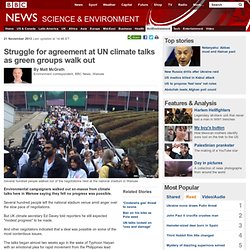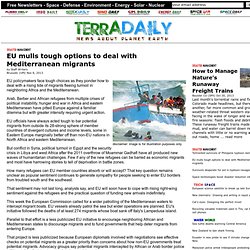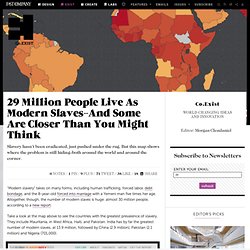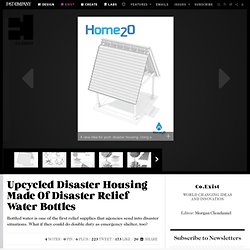

Like A Charity On Facebook? You're Now Less Likely To Actually Help. Charities rely on social media for fundraising.

So you might think that a big Facebook following should be good for a cause. Well, it turns out that a high "like" count doesn't lead necessarily to a high cash count. In fact, just the opposite. People who "like" causes are less likely to donate money or volunteer their time, according to a recent study in the Journal of Consumer Research. Researchers at the University of British Columbia compared how volunteers behaved after public displays of support (like Facebook liking and pin-wearing) and private actions (like signing a petition). Struggle for agreement at UN climate talks as green groups walk out. 21 November 2013Last updated at 14:46 ET By Matt McGrath Environment correspondent, BBC News, Warsaw Several hundred people walked out of the negotiations held at the national stadium in Warsaw Environmental campaigners walked out en-masse from climate talks here in Warsaw saying they felt no progress was possible.

Several hundred people left the national stadium venue amid anger over the slow pace of negotiations. But UK climate secretary Ed Davey told reporters he still expected "modest progress" to be made. EU mulls tough options to deal with Mediterranean migrants. EU policymakers face tough choices as they ponder how to deal with a rising tide of migrants fleeing turmoil in neighboring Africa and the Mediterranean.

Arab, Berber and African refugees from multiple crises of political instability, hunger and war in Africa and eastern Mediterranean have pitted Europe against a familiar dilemma but with greater intensity requiring urgent action. EU officials have always acted tough to bar potential migrants from outside its 28-strong sphere of member countries of divergent cultures and income levels, some in Eastern Europe marginally better off than non-EU nations in North Africa and eastern Mediterranean.
But conflict in Syria, political turmoil in Egypt and the security crisis in Libya and west Africa after the 2011 overthrow of Moammar Gadhafi have all produced new waves of humanitarian challenges. Shanty Town Resort Offers Tourists The Experience Of Extreme Poverty [Pics] Emoya Estate in South Africa has started offering its guests the chance to live like the many millions of impoverished Africans who take refuge in homes made from corrugated steel.
The shanty town is located on the company’s five-star luxury game reserve and comes with many things that you wouldn’t get in a real shanty town, like running water, electricity, Wi-Fi, and even underfloor heating. The resort has already attracted a lot of negative attention, much of which describes the shanty town as tasteless, insensitive and offensive to those who have no choice but to live in poverty. American political satirist Stephen Colbert went so far as to say: “At best, insensitive; and at worst, poverty porn.” A night in one of the ‘shacks’ costs $80 (R850), only slightly less than the $98 (R1,000) average monthly wage of a South African domestic worker. Emoya Estate Source: The Daily Mail. 29 Million People Live As Modern Slaves. "Modern slavery" takes on many forms, including human trafficking, forced labor, debt bondage, and the 8-year-old forced into marriage with a Yemeni man five times her age.

Altogether, though, the number of modern slaves is huge: almost 30 million people, according to a new report. Take a look at the map above to see the countries with the greatest prevalence of slavery. They include Mauritania, in West Africa, Haiti, and Pakistan. India has by far the greatest number of modern slaves, at 13.9 million, followed by China (2.9 million), Pakistan (2.1 million) and Nigeria (701,000). But it's not as though countries in the West are without sin. There are still countries West Africa and South Asia where people are born into "hereditary slavery. " This Amazing House Can Be Built Just 5 Hours After A Disaster.
With a fifth of their population below sea level, the Dutch have historically been ahead of the curve when it comes to planning for ecological disasters.

A new project from Dutch designer Pieter Stoutjesdijk takes that efficiency one step further, with an emergency shelter that can be built in a mere five hours. Upcycled Disaster Housing Made Of Disaster Relief Water Bottles. When a disaster like Typhoon Haiyan strikes, one of the first supplies relief agencies send is bottled water.

Now, a group of architects want to take the empty plastic bottles--and the pallets they’re delivered on--and turn them into upcycled disaster housing. Using a custom plastic pallet as the base, the Home2O makes a roof from crushed bottles that screw into bottle-sized holes. Each bottle layers on top of the last one, like Spanish tiles, until the roof is fully covered and weatherproof. The designers hope that the specially designed pallet can become standard.
“We want to intervene far upstream and invent an alternative shipping pallet for the beverage industry,” says Jason Van Nest, an assistant professor at New York Institute of Technology’s School of Architecture and Design, who is leading the project along with fellow professor Farzana Gandhi.